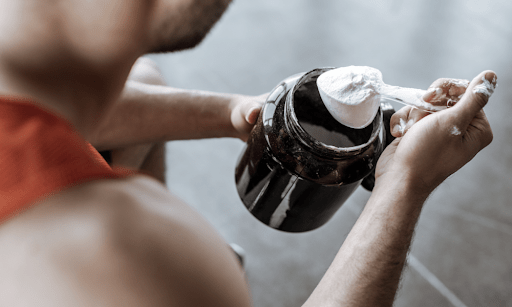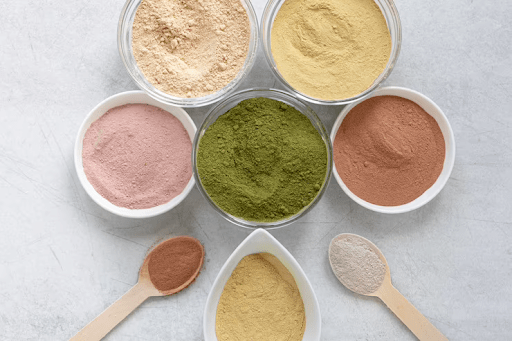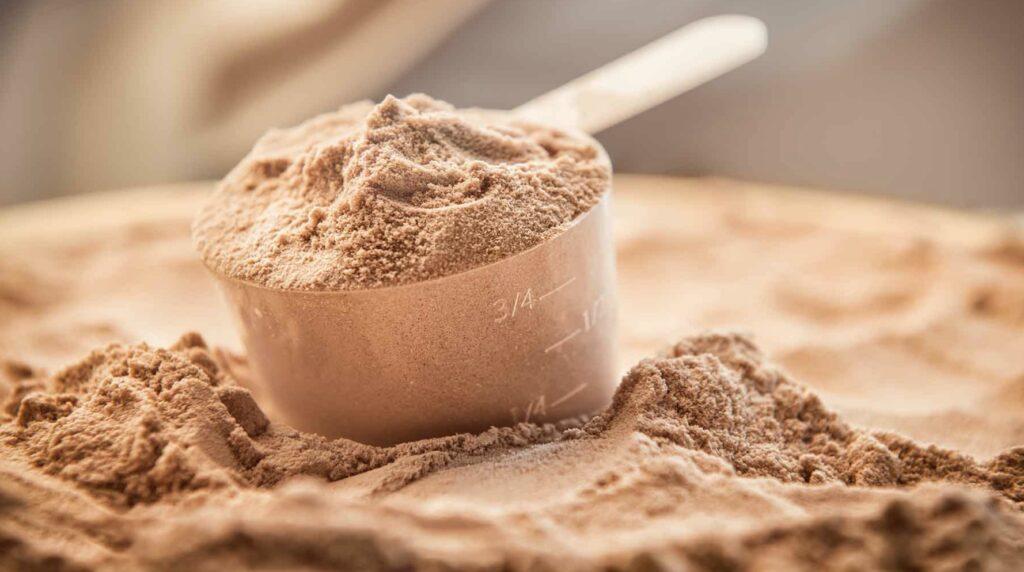- Messages
- 2,405
- Reaction score
- 1,432
- Points
- 113

Are you looking to boost your fitness, support muscle recovery, or enhance your daily nutrition? Protein powder might be the answer you’ve been searching for!
Protein powder is an invaluable tool in a bodybuilder’s arsenal, offering many benefits that can enhance your performance, promote muscle growth, and support overall fitness goals.
With various options available, it has become a staple in athletes’ diets, fitness enthusiasts, and health-conscious individuals worldwide. But navigating the world of protein powders can be overwhelming, as each type has unique benefits and characteristics.
This comprehensive guide dives into the diverse world of protein powders, exploring the different types, their sources, and their specific roles in supporting your health and fitness goals.
WHAT ARE PROTEIN POWDERS?
Protein powder is a dietary supplement made from various protein sources, such as rice, dairy, and eggs, typically used to increase protein intake.
It comes in powdered form and can be easily mixed with water, milk, or other beverages to create protein shakes or added to recipes for additional protein content.
People take protein powder to boost their protein because protein is an essential macronutrient in the body. It plays a crucial role in building and repairing muscle tissues after a workout, producing enzymes and hormones, supporting the immune system, and maintaining various physiological functions.
While you can primarily obtain protein from whole foods such as meat, fish, dairy, legumes, and nuts, protein powder offers a convenient and efficient way to increase protein intake, especially if you are a bodybuilder or have specific dietary requirements.
Protein powder is commonly used by athletes, bodybuilders, and fitness enthusiasts.

7 DIFFERENT TYPES OF PROTEIN POWDER
Protein powders come in various types, flavors, and compositions to cater to different tastes and dietary requirements. But the most common protein powders are sourced from dairy eggs and plant protein foods.
Here are some of the most common types of protein powder:
1. WHEY PROTEIN
Whey protein powder is a complete protein derived from milk during cheese-making. A complete protein contains all nine essential amino acids the body cannot produce independently.
It is quickly absorbed and efficiently utilized by the body, making it an excellent protein source for promoting strength, muscle recovery, and growth after an intense workout such as strength training.
Its complete amino acid content and high absorption rate make it one of the most popular protein powders in the market used by bodybuilders.
Whey protein powder has three categories: whey protein powder concentrate, hydrolysate, and isolates.
WHEY PROTEIN ISOLATE
Whey protein isolate is a highly filtered whey protein that has been further processed to remove most of the non-protein components, including lactose, carbs, and fat, resulting in a product with higher protein content.
It contains 90% to 95% protein, less than 1% fat, and fewer carbs, carbohydrates, and lactose. This makes it one of the highest quality and purest forms of whey protein available on the market, which is also expensive.
Whey protein powder suits bodybuilders seeking to lose fat while maintaining lean muscles and those on dietary restrictions or individuals who cannot tolerate lactose.
WHEY PROTEIN CONCENTRATE
Whey protein is similar to whey protein isolate but has less protein content and more non-protein components due to its limited processing and filtration. It typically contains a protein content ranging from 70% to 80% by weight. The remaining portion comprises carbohydrates (mainly lactose), fats, and minerals.
The high caloric content and its limited refinement process make it a low-quality protein powder compared to whey protein isolate. Additionally, whey protein concentrate is generally more cost-effective than whey protein isolate, as it undergoes less processing and retains more of the natural components found in whey.
It fits bodybuilders looking to build or maintain muscles and promote recovery after a workout. It’s more lactose and fat content can make it less suitable for individuals with lactose intolerance or those seeking a lower-carbohydrate option.
WHEY HYDROLYSATE
Whey protein hydrolysate powder is a variation of whey protein produced by further heating with heat, acid, or enzymes to break the bonds between the amino acids. It undergoes more refinement processes than whey-isolated powder.
Due to its broken-down nature, the body can rapidly absorb it, leading to a swift increase in amino acids in the bloodstream. This property makes it ideal for immediate post-workout consumption when the body needs quick protein for muscle repair and recovery. It also prevents obesity and diabetes when combined with a workout.
The hydrolysis process reduces the allergenic potential of whey protein, making it a suitable option for some individuals who may be sensitive to other forms of whey protein or have mild lactose intolerance.
2. CASEIN PROTEIN POWDER
Like whey, casein powder is also derived from milk. However, casein is a slow-digesting protein that sustains amino acid release into the bloodstream.
When you consume it, casein curdles in the stomach acid to form a gel, slowing down digestion, leading to a gradual and sustained release and absorption of amino acids into the bloodstream. Slow absorption of amino acid causes a reduction in the rate of muscle protein breakdown.
Although casein has a low absorption rate, its gradual release of amino acids helps support muscle protein synthesis and strength more than soy and wheat protein powder. It also prevents excessive muscle breakdown during periods of inadequate protein intake.
Due to its slow digestion, casein protein can be particularly beneficial during extended fasting periods, such as overnight sleep. Most bodybuilders take it before bedtime to support overnight muscle growth and body composition.
3. EGG PROTEIN POWDER
Egg protein powder is a dietary supplement made from the whites of eggs. It provides a convenient and concentrated source of high-quality protein, making it an excellent supplement option.
Like whey and casein, egg protein powder is a complete protein because it contains all nine essential amino acids. Additionally, it has the highest protein digestibility-corrected amino acid score that measures protein quality and digestibility.
Egg protein powder also has a high biological value, indicating that it is well-absorbed and efficiently utilized by the body. It provides a good balance of essential amino acids, making it an adequate protein source for muscle growth and strength.
In fact, the research found that female athletes who consumed egg white protein saw similar increases in lean mass and muscle strength to those who consumed carbohydrate supplements.
It is suitable for individuals who are not allergic to eggs and those who are lactose intolerant or have milk allergies.
4. PEA PROTEIN
Pea protein is a popular plant-based protein powder sourced from yellow peas splits. It is easily digestible and hypoallergenic, making it an excellent option if you are vegetarian and vegan or have lactose intolerance or egg allergies.
Pea protein powder is also a complete protein rich in branched chain amino acids (BCAA), essential for muscle protein synthesis and recovery after exercise. This makes it a valuable protein source supporting various functions such as muscle repair, growth, and overall health.
Compared to whey protein, pea protein powder releases amino acids into the bloodstream slower than whey protein powder. However, when combined with eight-week high-intensity workouts, its effectiveness for enhancing body composition, muscle density, workout performance, and strength is similar to whey protein powder.
5. BROWN RICE PROTEIN
Brown rice protein powder is made from brown rice. However, it is not a complete protein on its own, as it needs more levels of the amino acid lysine. But, when combined with other plant-based protein sources higher in lysine, such as peas or hemp, it can form a complete protein with all nine essential amino acids.
Brown rice protein is generally well-tolerated, easy to digest, and free from common allergens like dairy, making it a safe option for people with various food-sensitive stomachs or allergies.
It is also low in fat and does not contain cholesterol, making it a lean protein source. Additionally, it retains some fiber from the rice, aiding digestion and supporting good gut health.
It is an excellent option if you are following vegetarian, vegan, or gluten-free diets and for those with allergies to dairy, soy, or other common allergens.
6. HEMP PROTEIN POWDER
Hemp protein powder is derived from hemp seeds and contains a mix of essential amino acids. It also provides essential fatty acids, making it nutritious for some.
Hemp protein is not complete because it has low lysine amino acids. However, it is naturally rich in omega-3 fatty acids, particularly alpha-linolenic acid (ALA), supporting heart health and reducing inflammation.
Consuming hemp protein powder after a workout can help replenish amino acids and support muscle recovery and growth. Also, mixing hemp protein powder into a smoothie or yogurt can provide sustained energy for workouts.
7. PLANT-BASED BLENDS PROTEIN POWDER
Plant-based protein blend powders include multiple plant-based protein sources to create a well-rounded and balanced amino acid profile.
Combining different plant protein sources overcome the limitations of individual plant proteins that may lack certain essential amino acids. Additionally, they often contain additional nutrients, such as fiber, healthy fats, vitamins, and minerals, contributing to overall nutrition and providing added health benefits.
They are an excellent option for vegans, vegetarians, and individuals with dietary restrictions. Below are some plant-based proteins you can blend.
- Quinoa
- Brown rice
- Soy protein
- Chia seeds
- Hemp
- Flaxseed
- Alfalfa

5 FACTORS TO CONSIDER WHEN CHOOSING A PROTEIN POWDER
As a bodybuilder, athlete, or fitness enthusiast, choosing a suitable protein powder is essential to support your muscle-building, recovery, and overall fitness goals. Here are some key factors to consider when selecting a protein powder:
1. PROTEIN CONTENT
Look for a protein powder with a high protein content per serving. A high-quality protein powder should have a high protein concentration, ideally around 70% or more or at least 20-30 grams per serving, which is ideal for bodybuilders especially. This helps ensure you are getting an adequate amount of protein to support muscle protein synthesis and recovery.
Whey protein, whey isolate, and casein protein have high-quality amino acid protein profiles. Plant-based protein blends are also effective for meeting protein needs.
2. PROTEIN SOURCE AND INGREDIENTS
Consider the source of protein in the powder. If you have dietary restrictions, look for protein powders made from peas, rice, hemp, or a blend of various plant proteins.
Also, be mindful of added ingredients like sugars, artificial sweeteners, or excessive fats. A high-quality protein powder should have a short, straightforward ingredient list with minimal additives, fillers, or artificial ingredients.
3. DIGESTIBILITY AND ABSORPTION RATE
Choose a protein powder that is easy on your digestive system. Some individuals may experience bloating or gastrointestinal discomfort with specific protein sources, so finding one that agrees with your body is essential.
Also, consider the protein powder’s absorption rate. Whey protein is rapidly absorbed and is ideal for post-workout recovery, while casein protein is slow-digesting and suitable for sustained protein release, like before bedtime.
4. PRICE AND VALUE
Compare the cost of different protein powders and consider the value you are getting for the price. High-quality protein powders can be an investment in your fitness journey, but be cautious of overpriced products that may offer little benefits.
5. BRAND REPUTATION
Opt for protein powders from reputable brands undergoing third-party testing for quality and purity. Look for certifications or seals indicating good manufacturing practices and product purity.
CONCLUSION
It’s important to note that protein powders are supplements. While they can benefit specific individuals, it’s generally best to obtain most of your protein needs from a well-balanced diet that includes a variety of whole food sources.
Always consult a healthcare professional or registered dietitian before adding protein powder or any dietary supplement to your routine, especially if you have any underlying health conditions or concerns.

